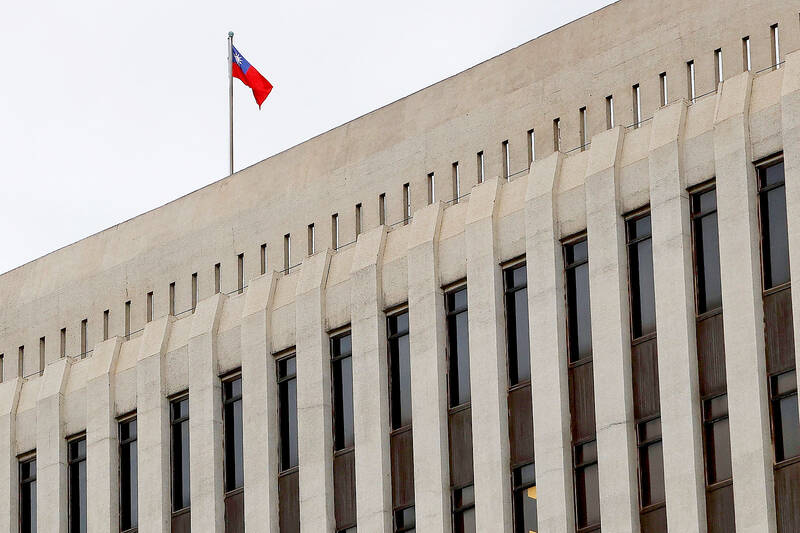A triple whammy of tightening factors is pushing banks to scale back purchases of central bank deposits at the fastest pace on record, a sign that market liquidity is shrinking.
Monetary policy tightening, a seasonal impact from tax payments, and an investment boom that is drawing cash into stocks are all coming at the same time.
That has cut demand for negotiable certificates of deposits (NCDs) and certificates of deposits (CDs) issued by the central bank — a key tool to manage liquidity as onshore banks use them to store excess cash.

Photo: Ann Wang, Reuters
Banks have cut NT$416.1 billion (US$12.85 billion) of purchases so far this month, the biggest monthly decline since at least 2002, when Bloomberg began tracking the data.
The total amount of outstanding NCDs and CDs has fallen to about a five-year low.
“As Taiwan’s central bank sticks with a tightening stance, while the hype around local stock and foreign bond ETFs [exchange traded funds] continues to attract money, banks are left with less accessible funds in hand,” Masterlink Securities Investment Advisory (元富投顧) economist Anita Hsu said.
The central bank increased policy rates in March and on June 13 said that it would raise the reserve requirement ratio (RRR) for banks next month.
That, coupled with people pulling money away from saving accounts to pay taxes or invest in stocks, resulted in tighter liquidity for lenders and hurt their appetite for the NCDs, said a central bank official who declined to be named as the person was not authorized to comment publicly.
With money market rates already ticking up and the reserve requirement ratio hike set to take effect on July 1, deposit purchases might not recover soon, the official said.
An auction on Wednesday of the central bank’s two-year NCDs recorded an average yield of 1.461 percent, the highest in more than two years.
Analysts expect short-term rates and interest rate swaps (IRS) — a measure of policy rate expectations — to rise further on the possibility that the central bank would keep raising borrowing costs.
That might mean liquidity continues to leave the system. One-year IRS yesterday reached the highest level since 2014.
“We do not rule out further tightening, via policy rate or RRR or both, if the real-estate market continues to overheat,” said Ju Wang (王菊), head of greater China forex and rates strategy at BNP Paribas SA. “We look for opportunities to re-enter IRS steepeners.”

Intel Corp chief executive officer Lip-Bu Tan (陳立武) is expected to meet with Taiwanese suppliers next month in conjunction with the opening of the Computex Taipei trade show, supply chain sources said on Monday. The visit, the first for Tan to Taiwan since assuming his new post last month, would be aimed at enhancing Intel’s ties with suppliers in Taiwan as he attempts to help turn around the struggling US chipmaker, the sources said. Tan is to hold a banquet to celebrate Intel’s 40-year presence in Taiwan before Computex opens on May 20 and invite dozens of Taiwanese suppliers to exchange views

Application-specific integrated circuit designer Faraday Technology Corp (智原) yesterday said that although revenue this quarter would decline 30 percent from last quarter, it retained its full-year forecast of revenue growth of 100 percent. The company attributed the quarterly drop to a slowdown in customers’ production of chips using Faraday’s advanced packaging technology. The company is still confident about its revenue growth this year, given its strong “design-win” — or the projects it won to help customers design their chips, Faraday president Steve Wang (王國雍) told an online earnings conference. “The design-win this year is better than we expected. We believe we will win

Chizuko Kimura has become the first female sushi chef in the world to win a Michelin star, fulfilling a promise she made to her dying husband to continue his legacy. The 54-year-old Japanese chef regained the Michelin star her late husband, Shunei Kimura, won three years ago for their Sushi Shunei restaurant in Paris. For Shunei Kimura, the star was a dream come true. However, the joy was short-lived. He died from cancer just three months later in June 2022. He was 65. The following year, the restaurant in the heart of Montmartre lost its star rating. Chizuko Kimura insisted that the new star is still down

While China’s leaders use their economic and political might to fight US President Donald Trump’s trade war “to the end,” its army of social media soldiers are embarking on a more humorous campaign online. Trump’s tariff blitz has seen Washington and Beijing impose eye-watering duties on imports from the other, fanning a standoff between the economic superpowers that has sparked global recession fears and sent markets into a tailspin. Trump says his policy is a response to years of being “ripped off” by other countries and aims to bring manufacturing to the US, forcing companies to employ US workers. However, China’s online warriors